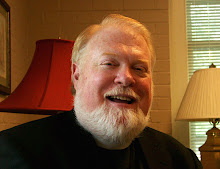Someone (perhaps Woody Allen) has said that a high percentage of life (90% or so) is "showing up." While life is indeed more complicated than that it is worthy of all to be received that without showing up not much gets done. There is an interesting pattern in the Old Testament where God calls and the person addressed says, "here am I." It seems more or less at first examination a simple matter of good manners. But then good manners and good theology often come from the same place. We find no such manners in the Book of the Prophet Jonah.
The word of the Lord came to Jonah the son of Amittai… but Jonah does not answer. Rather he runs away from the presence of the Lord. Where else do we find this but in Genesis when The Lord came down to walk in Eden at the cool time in the late afternoon and as he walked he called to Adam and Eve but they hid and said nothing ashamed of their nakedness.
Contrast this with Abraham who when God spoke always replied, “Here am I.” The word is hineni. [“In the Hebrew Bible the call of God and the answer hineni constitute moments of particular dramatic significance. Hineni is a performative utterance, as much as 'I promise' and 'I bless'. By saying hineni the speaker accepts responsibility for himself and for whatever task God may impose upon him. Adam and Jonah, quite simply, refuse to say hineni.” Pg. 172 The Book of God: A Response To The Bible, by Gabriel Josipoci]
Josipoci continues, "...after three days and three nights in the fish's belly, Jonah discovers that this is not where he wants to be...he suddenly finds it in himself to give voice; he calls out to God and God responds.
That there is not escape from dialogue is recognized by all those who are called by God: Noah, Abrahan, Moses, Samuel, Isaiah, Jeremiah. When God first calls them their response is usually: 'Please, leave me alone. I don't want to speak to you. I'm not worth. I can't do it. Try someone else.' Nevertheless, they answer, and God strengthens them, telling them he will always be with them. [pg. 171]
3Now the boy Samuel was ministering to the Lord under Eli. The word of the Lord was rare in those days; visions were not widespread.
2 At that time Eli, whose eyesight had begun to grow dim so that he could not see, was lying down in his room; 3the lamp of God had not yet gone out, and Samuel was lying down in the temple of the Lord, where the ark of God was. 4Then the Lord called, ‘Samuel! Samuel!’ and he said, ‘Here I am!’ 5and ran to Eli, and said, ‘Here I am, for you called me.’ But he said, ‘I did not call; lie down again.’ So he went and lay down. 6The Lord called again, ‘Samuel!’ Samuel got up and went to Eli, and said, ‘Here I am, for you called me.’ But he said, ‘I did not call, my son; lie down again.’ 7Now Samuel did not yet know the Lord, and the word of the Lord had not yet been revealed to him. 8The Lord called Samuel again, a third time. And he got up and went to Eli, and said, ‘Here I am, for you called me.’ Then Eli perceived that the Lord was calling the boy. 9Therefore Eli said to Samuel, ‘Go, lie down; and if he calls you, you shall say, “Speak, Lord, for your servant is listening.” ’ So Samuel went and lay down in his place.
10 Now the Lord came and stood there, calling as before, ‘Samuel! Samuel!’ And Samuel said, ‘Speak, for your servant is listening.’
Learning to listen and then to answer is a move in the right direction. It requires that we learn to quiet our minds so as to get the background static down to the point that we can hear the still small voice of the Holy One. Then we face the consequences of what to do with the call. And we are all called!

